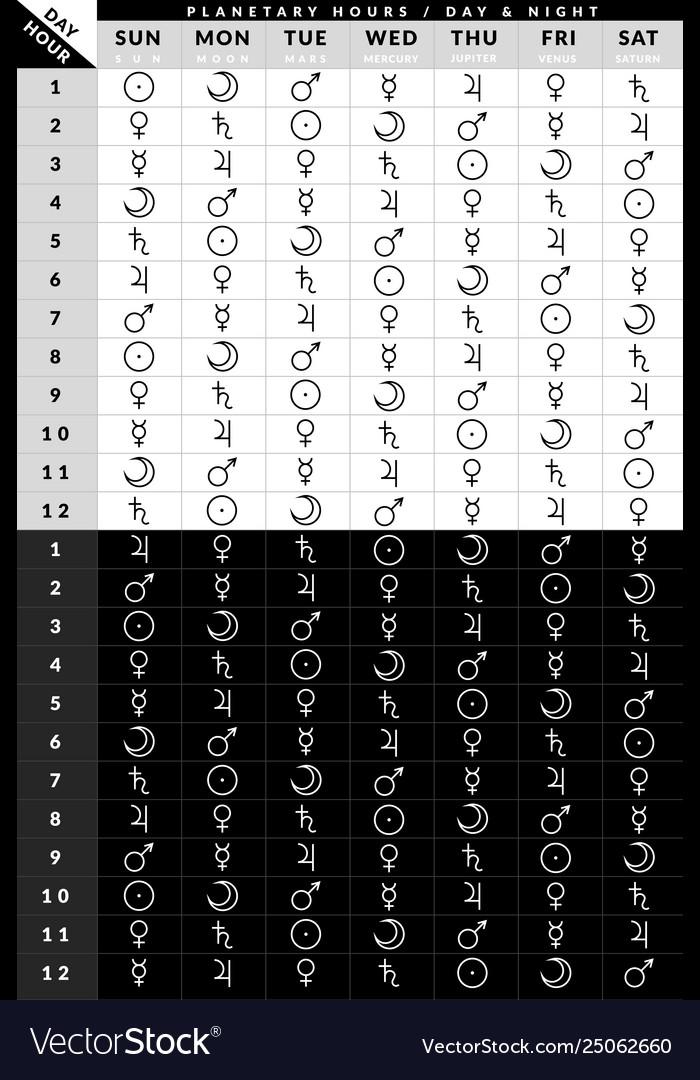Table of Contents
- Understanding the Concept of Natal Planetary Hours
- The Influence of Planetary Hours on Personal Astrology
- How to Calculate Your Natal Planetary Hour
- Practices and Rituals for Each Planetary Hour
- Utilizing Natal Planetary Hours for Enhanced Decision Making
- Q&A
- The Way Forward

Understanding the Concept of Natal Planetary Hours
The concept of planetary hours originates from ancient astrological practices, where each hour of the day is governed by a specific planet. This system assigns a unique energy to these hours based on the planets’ positions in relation to Earth. Understanding this concept requires recognizing that each planet embodies different characteristics and influences that can affect our daily lives. For instance, a period ruled by Venus may enhance feelings of love and beauty, while a time under the influence of Saturn could encourage discipline and structure.
To determine your natal planetary hours, you first need to identify your natal chart, which is a snapshot of the sky at the moment of your birth. In this chart, the positions of the planets and their corresponding effects help you understand which hours resonate more deeply with your personal energies. Generally, the planetary hour begins with the planet that rules the day and follows a specific sequence. Use the following list as a guide to understand which planets govern which days:
- Sun: Sunday
- Moon: Monday
- Mars: Tuesday
- Mercury: Wednesday
- Jupiter: Thursday
- Venus: Friday
- Saturn: Saturday
By aligning activities with the specific qualities of these planetary hours, individuals can harness the optimal energies to achieve their goals. For instance, planning important meetings or launching new projects during times governed by Jupiter can infuse your endeavors with luck and expansion, while creative tasks might be more fruitful during Venus hours. To clearly visualize these hours, consider the table below that illustrates how planetary hours cycle during a typical day:
| Hour of the Day | Planetary Ruler | Influence |
|---|---|---|
| 12 AM – 1 AM | Saturn | Discipline, Hard Work |
| 1 AM – 2 AM | Jupiter | Expansion, Growth |
| 2 AM - 3 AM | Mars | Action, Energy |
| 3 AM – 4 AM | Sun | Vitality, Leadership |

The Influence of Planetary Hours on Personal Astrology
The concept of planetary hours is intricately woven into the fabric of personal astrology, influencing various aspects of an individual’s life and experiences based on the celestial cycles. The idea is that each hour of the day is ruled by one of the seven traditional planets: the Sun, Moon, Mars, Mercury, Jupiter, Venus, and Saturn. As these planets transition in their respective cycles, their energetic qualities further shape the nature of each hour. Thus, understanding the planetary hours can provide profound insights into optimal times for personal actions, decisions, and manifesting desires.
Astrology enthusiasts often track these hours to align their activities with the specific attributes of each planet. For instance, Mercury hours are ideal for communication and intellectual pursuits, while Venus hours are perfect for love and harmonious relationships. Here are some key planets and their corresponding influences during their hours:
- Sun: Vitality and self-expression.
- Moon: Emotions and intuition.
- Mars: Action and assertiveness.
- Mercury: Communication and learning.
- Jupiter: Expansion and abundance.
- Venus: Beauty and attraction.
- Saturn: Discipline and structure.
By identifying one’s natal planetary hour—the hour when the ruling planet was at its zenith at the time of birth—individuals can gain a deeper understanding of their intrinsic characteristics and life path. This alignment enhances self-awareness and provides guidance on how to navigate challenges and opportunities effectively. A personalised approach can be taken to harness the energy of these hours, allowing for strategic decision-making that resonates with one’s astrological make-up. The table below summarizes how to calculate and utilize these hours based on your birth time.
| Step | Description |
|---|---|
| 1 | Find your birth time and convert it to Universal Time (UT). |
| 2 | Determine the ruling planet of the hour at the moment of your birth. |
| 3 | Use an astrological chart or app to calculate the corresponding planetary hours. |
| 4 | Align your daily activities with your planet’s energies for optimal outcomes. |

How to Calculate Your Natal Planetary Hour
To find your Natal Planetary Hour, begin by determining your birth time and date. Utilize an online astrology calculator or an ephemeris to identify the position of the Sun at your moment of birth. This crucial step sets the stage for understanding how planetary influences shape your life based on your sign and the ruling planets during specific hours of the day.
Next, you’ll want to establish your local time zone in relation to Universal Time (UTC). Understanding this difference is essential because planetary hours vary globally with the rise and set times of celestial bodies. Use the following method to convert your time to UTC:
- Find your local time and note the time zone.
- Adjust for daylight saving time if applicable.
- Add or subtract hours to obtain your UTC time.
Once you have your UTC birth time established, you can calculate the corresponding planetary hour for your natal chart. Planetary hours are allocated to celestial bodies in a repeating cycle based on their visibility throughout the day and night. The cycle includes:
| Planet | Hour Range |
|---|---|
| Sun | 6 AM – 7 AM |
| Venus | 7 AM – 8 AM |
| Mercury | 8 AM – 9 AM |
| Moon | 9 AM – 10 AM |
| Mars | 10 AM – 11 AM |
By mapping the alignment of planetary hours to your birth time and using the time-cycle table, you’ll gain a deeper insight into how the cosmic energies may be influencing your personal journey. This information can help you better understand the qualities that dominate your personality and decision-making, providing a unique tool for self-exploration and growth.

Practices and Rituals for Each Planetary Hour
Each planetary hour carries its own unique energy, influencing our actions and decisions throughout the day. Engaging in specific practices during these hours can enhance their effects and align your intentions with the celestial vibrations at play. Here are some rituals tailored to each planetary hour, designed to amplify your connection with these energies:
- Sun Hour: Focus on self-empowerment and leadership. Practice gratitude by journaling and spend time in nature to soak up the sun’s rays.
- Moon Hour: Embrace introspection and intuition. Meditate or engage in dream work, and consider lighting a white candle to enhance your emotional clarity.
- Mercury Hour: Ideal for communication and learning. Dedicate this time to writing, studying, or engaging in networking activities. Use crystals like Citrine to boost mental acuity.
- Venus Hour: Foster love and beauty in your life. Create art, indulge in self-care routines, or perform acts of kindness to deepen your relationships.
- Mars Hour: Utilize this time to focus on motivation and courage. Physical exercise or strategic planning can be highly beneficial; even a quick workout can channel this energy effectively.
- Jupiter Hour: Prosperity and growth flourish during this hour. Engage in philanthropic actions, study philosophy, or visualize your abundance to attract good fortune.
- Saturn Hour: Embrace discipline and responsibility. Organize a project, set long-term goals, or practice mindfulness to enhance resilience and structure in your life.
Using the appropriate crystals and scents can further enhance each planetary hour’s influence. Here’s a quick reference table for crystal and aromatic correspondences for every hour:
| Planetary Hour | Crystal | Aroma |
|---|---|---|
| Sun | Sunstone | Cedar |
| Moon | Lapis Lazuli | Lavender |
| Mercury | Agate | Peppermint |
| Venus | Rose Quartz | Jasmine |
| Mars | Hematite | Cinnamon |
| Jupiter | Yellow Jasper | Bergamot |
| Saturn | Obsidian | Pine |
By incorporating these rituals and tools into your practices, you can harness the unique energies of each planetary hour effectively. Whether through meditation, physical activities, or sensory experiences, these practices can enrich your connection to the cosmos and amplify your personal growth journey.
Utilizing Natal Planetary Hours for Enhanced Decision Making
Utilizing planetary hours based on your natal chart can significantly enhance your decision-making process. Each hour is governed by a specific planet, which brings with it unique energies and influences. By aligning your activities with these cosmic rhythms, you can make choices that resonate with your personal astrological profile. For instance, scheduling important meetings or engaging in critical negotiations during hours ruled by Jupiter can harness its expansive and benevolent qualities, fostering growth, success, and positivity.Understanding which planetary hour aligns with your individual birth chart adds a layer of personalization to your planning. Here are some key aspects to consider when harnessing this celestial tool:- Moon Hours: Ideal for nurturing activities, such as family gatherings or personal development.
- Mercury Hours: Perfect for communication tasks—think writing, calls, and brainstorming sessions.
- Venus Hours: These hours are great for anything related to love and relationships, whether personal or business-oriented.
- Saturn Hours: Best suited for tasks that require discipline and hard work, such as strategic planning.
| Planet | Hour Type | Optimal Activities |
|---|---|---|
| Jupiter | Expansion | Investments, promotions, networking |
| Venus | Harmony | Relationship building, artistic endeavors |
| Mars | Action | New projects, physical activities |
| Saturn | Discipline | Long-term planning, budgeting |
Q&A
Q&A on Natal Planetary Hour
Q1: What is a natal planetary hour?A: A natal planetary hour refers to the specific hour of the day when an individual is born, calculated based on the position of the planets at that moment. Each hour of the day is ruled by a different planet, and understanding which planet governs your natal hour can offer insights into your personality traits, life path, and potential challenges.Q2: How is the natal planetary hour determined?A: To determine your natal planetary hour, you need your exact birth time and date, along with your birthplace. Using astrological tables, you can identify which planet rules the hour of your birth. This can sometimes be done using online calculators or astrological software that aligns the planet’s positions with the timing of your birth.
Q3: Why should I care about my natal planetary hour?A: Knowing your natal planetary hour can enhance your understanding of yourself. Each planet influences different aspects of life, such as communication, love, career, and personal growth. By identifying the ruling planet during your birth hour, you can tap into its energy and gain insights to help navigate life’s challenges and opportunities more effectively.
Q4: Can knowing my natal planetary hour help with decision-making?A: Absolutely! Understanding your natal planetary hour allows you to harness the specific energies of that planet in your decision-making process. For example, if your hour is ruled by Venus, which is associated with love and relationships, you may feel more in tune with your emotions and make better decisions in those areas.
Q5: Are there any practical applications for knowing my natal planetary hour?A: Yes! Many people use their natal planetary hour for timing important life events, such as making major purchases, starting a project, or planning significant meetings. Aligning your actions with the energy of your ruling planet can help amplify positive outcomes.
Q6: Can I change or influence my natal planetary hour?A: Your natal planetary hour is fixed to your birth details, so it cannot be changed. However, you can certainly work with its energies and cultivate awareness of how it affects your life. Practicing mindfulness and intentionality can help you align your actions with the strengths associated with your ruling planet.
Q7: What if I was born during a time when two planets share the hour?A: In cases where two planets share the same hour, the influence may be a blend of both energies. This dual influence can provide a richer understanding of your traits and tendencies, as you may embody characteristics from both planetary influences, giving you a more nuanced perspective on your personality.
Q8: Are there resources for learning more about my natal planetary hour?A: Definitely! There are numerous astrological websites, books, and apps that can provide information on your natal planetary hour. Seeking guidance from a professional astrologer can also offer deeper insights tailored to your unique chart and life experience.
Q9: Is it common for people to know their natal planetary hour?A: Awareness of the natal planetary hour can vary across cultures and individual interest in astrology. While some people actively explore their birth charts and planetary hours, others may not be familiar with these concepts. Increasing interest in astrology, however, has sparked curiosity and exploration around personal natal charts for many.
Q10: What should I do if I want to explore my natal planetary hour further?A: Start by consulting your birth chart and calculating your natal planetary hour. From there, delve into resources that explore the meanings and implications related to your specific ruling planet. Consider reflecting on how these insights resonate with your experiences, and don’t hesitate to connect with a community of astrology enthusiasts or a professional astrologer for shared learnings.—This insightful blend of questions and answers can help demystify the concept of the natal planetary hour and inspire readers to explore its significance in their lives!


0 Comments